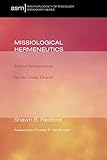Missiological hermeneutics : biblical interpretation for the global church / Shawn Barrett Redford ; foreword by Charles E. Van Engen.
Series: American Society of Missiology monograph series ; 11.Publication details: Eugene, Or. : Pickwick Publications, c2012.Description: xx, 363 p. : ill. ; 23 cmContent type:- text
- unmediated
- volume
- 1608994023
- 9781608994021
| Item type | Current library | Shelving location | Call number | Status | Date due | Barcode | |
|---|---|---|---|---|---|---|---|
 Books
Books
|
BSOP Library | GC | BS476 R24 2012 (Browse shelf(Opens below)) | Available | 00058754 |
Browsing BSOP Library shelves, Shelving location: GC Close shelf browser (Hides shelf browser)
| No cover image available | No cover image available | No cover image available |

|

|

|

|
||
| BS476 P87g God centered biblical interpretation / | BS476 P87g 1999 c.2 God centered biblical interpretation / | BS 476 R14 1970 c.5 No title | BS476 R24 2012 Missiological hermeneutics : biblical interpretation for the global church / | BS476 Sch8 2012 Out of context : | BS476 Si7s 1980 Scripture twisting : | BS476 Si7s 1980 c.2 Scripture twisting : |
Revision of: Thesis (Ph.D.-Intercultural Studies)--Fuller Theological Seminary, School of Intercultural Studies, 2007 ; Constructing a biblically informed and spiritually grounded missiological hermeneutic : in search of grace-filled mission practice / by Shawn Barrett Redford.
Includes bibliographical references and index.
One. Introduction
Two. Biblically Informed Missional Hermeneutics
Three. A Missional Critique of Current Hermeneutical Theory
Four. A Missional Critique of the Hermeneutics Used in a Difficult Missional Issue: A Case Study
Five. The Role of Mission Praxis upon Missiological Hermeneutics: A Case Study
Six. Conclusion
This book attempts to define missiological hermeneutics in Biblical Theology of Mission. The research considers the way that Scripture guides, critiques, informs and develops the hermeneutical process. Biblical figures are shown to utilize a missional hermeneutic as they engage in the interpretation Scripture in their time. Consequently, Scripture illustrates an over-arching hermeneutic infused with a high allegiance to God's mission and a genuine response to influential spiritual activity (Gen 12-50; Num 22-24; Ps 72; Dan 9-12; Mt 8-12; Ac 2-3, 10-11; Rom 4; Gal 3-4). Likewise, the field of Biblical Theology of Mission must properly critique the cultural polarization in Western hermeneutics by validating and developing new openness to God's mission and spiritual dimensions as an equally esteemed part of the total hermeneutical process. Following the biblical work and critique of existing hermeneutics, two missiological case studies are considered as they relate to hermeneutics. The first is a historical case considering the missional and theological hermeneutics employed when addressing African polygamy. For the most part, authors addressing polygamy have failed to consider God's missional response to polygamists in order to buttress their own convictions regarding African polygamy. As such, authors have not typically utilized a missional hermeneutic when trying to address polygamy. Instead, they have based their arguments on the false assumption that a given theological stance is the starting point for addressing the practice. The second case study considers the role of mission praxis in an Islamic context related to missiological hermeneutics. The case study demonstrates the impact of modern-day mission practice, especially when it correlates closely with the missionary dynamics in a given portion of Scripture. In this case, missionary experience provides one of the strongest hermeneutical lenses for biblical interpretation because this allows the missionary to perceive previously unforeseen mission activity in Scripture. The modem-day missional understandings provide a framework that allows the missionary to develop greater missional insight into a given biblical account. Finally, the conclusion outlines practical steps that can be taken to develop a missiologic herrneneutic.


